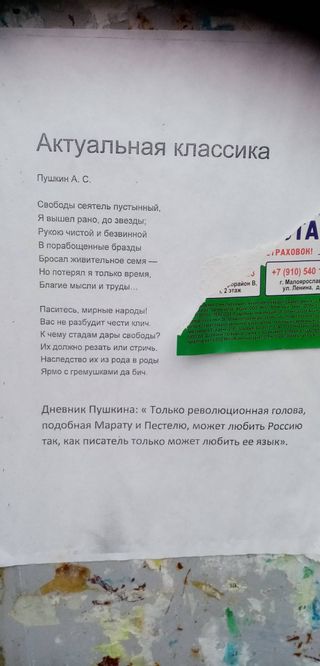Of desert lands the freedom planter,
Before the star I rose to sow;
Into the soil enslaved and scanter
My pure and guiltless hand would throw
The seeds of vigor and fruition —
But only wasted good ambition
And time and labor doing so...
Graze on your pasture, peaceful nations!
Miss honor's call, in slumber's grip —
Why freedom? Herds have these vocations:
Be meat to slay or wool to clip.
They pass along through generations
A yoke with rattles and a whip.
"Only a revolutionary thinker like Mirabeau or Peter could love Russia the way a writer loves its language". Translated by Catherine Theimer Nepomnyashchy and Slava I. Yastremski"
This poem by the famous Russian poet Alexander Pushkin was written in November 1823. The bitter feelings in it have been suggested to have resulted from the defeat of the revolution in Spain, suppressed by French troops. After the defeat of the revolution in Spain, the absolutist monarchy was restored.
Свободы сеятель пустынный,
Я вышел рано, до звезды;
Рукою чистой и безвинной
В порабощенные бразды
Бросал живительное семя —
Но потерял я только время,
Благие мысли и труды...
Паситесь, мирные народы!
Вас не разбудит чести клич.
К чему стадам дары свободы?
Их должно резать или стричь.
Наследство их из рода в роды
Ярмо с гремушками да бич.
Дневник Пушкина: "Только революционная голова, подобная Марату или Пестелю, может любить Россию так, как писатель только может любить ее язык".
Это стихотворение известного российского поэта Александра Пушкина написано в ноябре 1823 и горькие чувства в нем вызваны, как предполагают исследователи, поражением революции в Испании, подавленной французскими войсками. После поражения революции в Испании была восстановлена абсолютистская монархия.
- Date:
- 24.06.2022
- Location:
- Portvino, Moscow region
- Category:
- Authority-based message
- Setting:
- Bulletin board
- Stylistic means:
- Flyer
- Item ID:
- 435-Protvino-24-06
Show all graffiti
